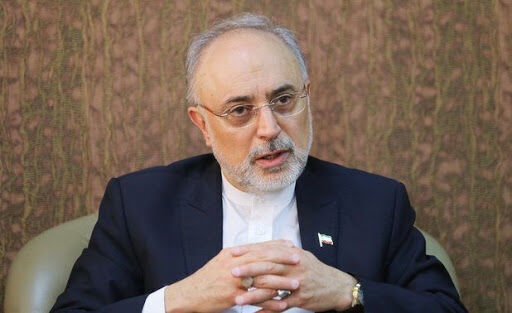
Salehi in the interview with the American TV, responded to questions in numerous fields, including world powers’ access to nuclear bombs, restraint power of atomic weapons, Israel’s nuclear warheads, possible proponents of atomic bombs among Iranian officials, excerpts of which are presented hereunder.
He also elaborated on various Iranian officials’ often-repeated claim that Iran’s nuclear program is only for peaceful purposes and the fact that it is haram to manufacture atomic bombs for Iran according to a religious decree issued by the Supreme Leader of the Islamic Revolution.
The IAEO chief stressed: The final word was said by the Supreme Leader Ayatollah Seyyed Ali Khamenei, who issued a religious decree that is irrevocable on being haram of manufacturing the nuclear bombs, so there is no room for more talks on the matter.
“Everyone can talk about their thoughts, mentalities, and desires, but in practice, we need to act in accordance with what the religious decree says,” added Salehi.
Asked if there are people in the Iranian political system who might consider the atomic bombs an appropriate option, the IAEO chief said, “I do not know, there might be some people who think so.”
The PBS reporter asked how come the atomic bombs are religiously forbidden, but the long-range missiles are not haram?
“The long-range ballistic missiles target certain subjects that are intended to be demolished, but the atomic bombs, like those used in Hiroshima and Nagasaki, had 200,000 casualties within only the first second after hitting the ground, turning them into powder, and have still effects on next generations,” he responded.
Return is required for the side that exits
The Iranain nuclear chief referred to the unilateral US exit from the Joint Comprehensive Plan of Action (JCPOA) and Iran’s remaining in its framework, asking: Why should we complicate the matter? The side whose exit from the JCPOA is recorded must return to it, not any of the existing members.
Salehi emphasized that the hue and cry about the Iranian nuclear issue are artificial and fabricated to achieve political objectives, reiterating, “The issue was a purely technical matter, turned into political chaos. That is the reason why we have been urged to use political means to resolve it.”
On limitations imposed by Iran against the International Atomic Energy Agency (IAEA) inspectors, Salehi said: We did not impose any limitations against the IAEA inspectors. What we did was abandoning only a part of our voluntary acts, which were within the nuclear-Non Proliferation Treaty (NPT) Additional Protocol.
“The cameras of the IAEA are all still functioning and recording whatever they want, but the agency is not capable of having access to their data for three months. Yet, if every side will start acting in accordance with their JCPOA commitments, the cameras will broadcast data to the IAEA live,” he added.
On transparency of the Iranian nuclear program, and demolishing of the IAEA cameras’ data if all other IAEA sides will not return to their JCPOA commitments within three months, Salehi said: Solving this problem is quite easy. They should before that date return to observation of their JCPOA commitments and not let that happen.
***The assassination of martyr Fakhrizadeh
The PBS reporter asked if martyr Mohsen Fakhrizadeh’s assassination was due to the weakness of the Iranian security apparatus.
“That was not a very complicated plot. If you intend to launch a terrorist attack against an individual all you have to do is to hire a terrorist or a number of them to do so,” said Salehi, adding that there is no doubt that Israel was involved in that terrorist assassination, in collaboration with the United States.
Are you worried about your own security?
“I’m not worried about that, because I believe life and death are issues within God’s Will, and furthermore, we will all die, sooner or later, therefore, if we are martyred so much the better.
1424
Follow us on Twitter @irnaenglish
IRNA English solhkhabar | Peace International News Agency Peace International News Agency , Peace News , International Agency News of Peace
solhkhabar | Peace International News Agency Peace International News Agency , Peace News , International Agency News of Peace